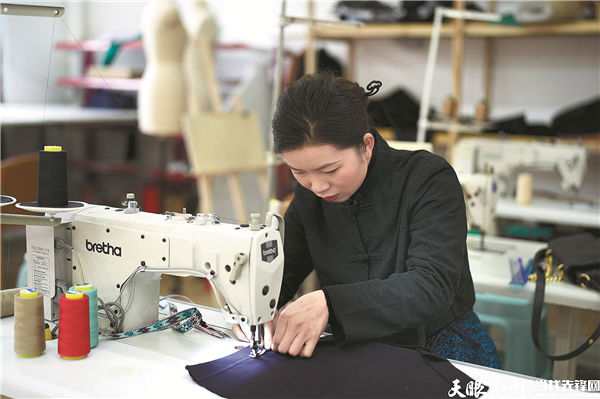

She thus embarked on a nine-year journey that took her from a garment factory to a handbag workshop and eventually into sales positions. In the interim, she honed her sewing, cutting and design skills. Her experience in sales taught her the art of persuasion and the value of building relationships with customers. She then found an entrepreneurial spirit emerging in her.
"Growing up in the culture of the ethnic Bouyei group, I deeply love my origins and have always wanted to promote the culture of my people and make it known to the world," she says.
This urge grew stronger after she worked outside her home village for a long time. "You would feel a lack of sense of belonging and miss everything from your hometown," Li says.
Her increasing knowledge and experience sharpened her belief that the intangible cultural heritage of her home should not be left behind. Therefore, Li quit her job and returned to the mountains of Guizhou. In 2016, Li started up her own business, Bouyei Yao Cultural Development Co in Xingyi, a county-level city in the southwest of the prefecture.
She started to produce a series of ethnic cultural and creative products, including hand-woven bags, clothing, scarves, bedding, and small items. She made a point of incorporating Bouyei ethnic elements into daily necessities, as well as creative cultural products, which gave the traditional weaving techniques a new charm.
Those distinctive ethnic products got positive market feedback and were then sold in Beijing and Shanghai metropolises, as well as Zhejiang, Guangdong and Fujian provinces.
In the Bouyei language, the company's name Bouyei Yao means "we are Bouyei people". Li says she hopes her business can "elevate ethnic cultural creativity to a new level through hard work, and let the ethnic brand go global".
As her business grew, Li increasingly realized that the key to retaining good craftsmanship lies with traditional craftsmen.
Making ethnic clothes involves intricate yet delicate handicraft, from yarn spinning to thread arrangement and weaving.
Besides technique, a profound culture exists behind the costumes.
Wang Jing, a Bouyei costume craftswoman, says that generally speaking, flowers, birds, fish and insects are the major symbols on Bouyei costumes. "They all originated from nature and have been artistically processed to evolve into the patterns we see today," Wang says.
Ethnic costume styles vary with the local environment. "For example, aquatic animals like fish and shrimp have emerged more in embroideries near the Nanpan River, while those originating in mountainous areas feature flowers, grass, bamboo and banana leaves," Wang explains.
Li believes it is the cultural inheritance from generation to generation that makes ethnic craftsmanship unique and charming.
To breathe new life into her products and ensure better and more sustainable development of traditional ethnic costumes, Li took the plunge and moved her company to Zitang village in 2019, with the aim of bringing together local experienced ethnic costume makers.
"With the help of my family at home, we gathered nearby embroidery artists to work in the company, allowing them to leverage their expertise to pass on ethnic handicrafts while increasing their income by working from home," Li says.
Although the transportation and logistics are a bit inconvenient, Li considers this a small price to pay.
In June 2020, her cause won support from the local authorities, who assigned her a 400-square-meter plant with a favorable rent.